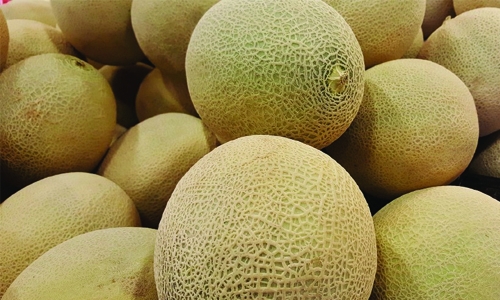Don’t eat melons for the time being
The authorities here yesterday confirmed that they have taken all measures necessary to withdraw rockmelons tainted with deadly listeriosis bacteria from the local market.
The move follows a warning issued by World Health Organisation (WHO) saying that Bahrain is among the nine countries that received shipments of melons contaminated with deadly listeriosis bacteria.
Responding to the development, in a joint statement issued, the Ministry of Health(MOH) and the concerned department from the Works, Municipalities and Urban planning ministry also instructed consumers here to “avoid this fruit for the time being to avoid the disease”.
The statement further confirmed that “the imported quantity in Bahrain is small” and that all precautionary measures have been taken “to ensure that’s it’s not imported by the concerned authorities in the Kingdom.”
Authorities have also formed a specialised MOH team to follow up on the matter, in coordination with the concerned agricultural departments in Works, Municipalities Affairs and Urban Planning Ministry, which announced last month that a ban on the import of Australian melons has been enforced, with the aim of protecting consumers’ health.
According to WHO Australia exported rockmelons or cantaloupes to Hong Kong, Japan, Kuwait, Malaysia, Oman, Qatar, Singapore, the United Arab Emirates and Bahrain, and may also have gone to Seychelles.
Media reports claim that between Jan 17 and April 6 19 cases of infections were confirmed in Australia. Seven died.
The Listeria monocytogenes bacterium, according to WHO, has a potentially long incubation period, usually one or two weeks but possibly up to 90 days, “so more cases may be reported”.
The milder symptoms of Listeriosis are diarrhoea and fever. Elderly people, pregnant women, patients undergoing treatment for cancer, and HIV are more likely to suffer from the severe form of the disease which can also cause septicemia and meningitis. A 20-30 percent mortality rate was noted in the severe form of the disease.
The Australian melon producer, which the WHO did not name, recalled the fruit on Feb 27.
It is believed that the cause of the outbreak was a combination of environmental conditions and weather contaminating the surface of the fruit, with low levels of the bacteria persisting after the washing process.
Related Posts

